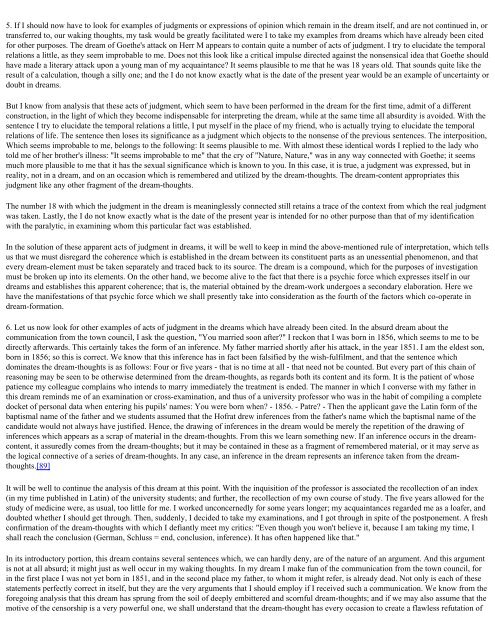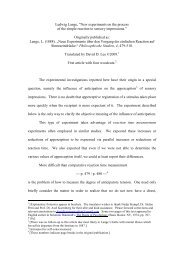The Interpretation Of Dreams Sigmund Freud (1900) PREFACE
The Interpretation Of Dreams Sigmund Freud (1900) PREFACE
The Interpretation Of Dreams Sigmund Freud (1900) PREFACE
You also want an ePaper? Increase the reach of your titles
YUMPU automatically turns print PDFs into web optimized ePapers that Google loves.
5. If I should now have to look for examples of judgments or expressions of opinion which remain in the dream itself, and are not continued in, or<br />
transferred to, our waking thoughts, my task would be greatly facilitated were I to take my examples from dreams which have already been cited<br />
for other purposes. <strong>The</strong> dream of Goethe's attack on Herr M appears to contain quite a number of acts of judgment. I try to elucidate the temporal<br />
relations a little, as they seem improbable to me. Does not this look like a critical impulse directed against the nonsensical idea that Goethe should<br />
have made a literary attack upon a young man of my acquaintance? It seems plausible to me that he was 18 years old. That sounds quite like the<br />
result of a calculation, though a silly one; and the I do not know exactly what is the date of the present year would be an example of uncertainty or<br />
doubt in dreams.<br />
But I know from analysis that these acts of judgment, which seem to have been performed in the dream for the first time, admit of a different<br />
construction, in the light of which they become indispensable for interpreting the dream, while at the same time all absurdity is avoided. With the<br />
sentence I try to elucidate the temporal relations a little, I put myself in the place of my friend, who is actually trying to elucidate the temporal<br />
relations of life. <strong>The</strong> sentence then loses its significance as a judgment which objects to the nonsense of the previous sentences. <strong>The</strong> interposition,<br />
Which seems improbable to me, belongs to the following: It seems plausible to me. With almost these identical words I replied to the lady who<br />
told me of her brother's illness: "It seems improbable to me" that the cry of "Nature, Nature," was in any way connected with Goethe; it seems<br />
much more plausible to me that it has the sexual significance which is known to you. In this case, it is true, a judgment was expressed, but in<br />
reality, not in a dream, and on an occasion which is remembered and utilized by the dream-thoughts. <strong>The</strong> dream-content appropriates this<br />
judgment like any other fragment of the dream-thoughts.<br />
<strong>The</strong> number 18 with which the judgment in the dream is meaninglessly connected still retains a trace of the context from which the real judgment<br />
was taken. Lastly, the I do not know exactly what is the date of the present year is intended for no other purpose than that of my identification<br />
with the paralytic, in examining whom this particular fact was established.<br />
In the solution of these apparent acts of judgment in dreams, it will be well to keep in mind the above-mentioned rule of interpretation, which tells<br />
us that we must disregard the coherence which is established in the dream between its constituent parts as an unessential phenomenon, and that<br />
every dream-element must be taken separately and traced back to its source. <strong>The</strong> dream is a compound, which for the purposes of investigation<br />
must be broken up into its elements. On the other hand, we become alive to the fact that there is a psychic force which expresses itself in our<br />
dreams and establishes this apparent coherence; that is, the material obtained by the dream-work undergoes a secondary elaboration. Here we<br />
have the manifestations of that psychic force which we shall presently take into consideration as the fourth of the factors which co-operate in<br />
dream-formation.<br />
6. Let us now look for other examples of acts of judgment in the dreams which have already been cited. In the absurd dream about the<br />
communication from the town council, I ask the question, "You married soon after?" I reckon that I was born in 1856, which seems to me to be<br />
directly afterwards. This certainly takes the form of an inference. My father married shortly after his attack, in the year 1851. I am the eldest son,<br />
born in 1856; so this is correct. We know that this inference has in fact been falsified by the wish-fulfilment, and that the sentence which<br />
dominates the dream-thoughts is as follows: Four or five years - that is no time at all - that need not be counted. But every part of this chain of<br />
reasoning may be seen to be otherwise determined from the dream-thoughts, as regards both its content and its form. It is the patient of whose<br />
patience my colleague complains who intends to marry immediately the treatment is ended. <strong>The</strong> manner in which I converse with my father in<br />
this dream reminds me of an examination or cross-examination, and thus of a university professor who was in the habit of compiling a complete<br />
docket of personal data when entering his pupils' names: You were born when? - 1856. - Patre? - <strong>The</strong>n the applicant gave the Latin form of the<br />
baptismal name of the father and we students assumed that the Hofrat drew inferences from the father's name which the baptismal name of the<br />
candidate would not always have justified. Hence, the drawing of inferences in the dream would be merely the repetition of the drawing of<br />
inferences which appears as a scrap of material in the dream-thoughts. From this we learn something new. If an inference occurs in the dreamcontent,<br />
it assuredly comes from the dream-thoughts; but it may be contained in these as a fragment of remembered material, or it may serve as<br />
the logical connective of a series of dream-thoughts. In any case, an inference in the dream represents an inference taken from the dreamthoughts.[89]<br />
It will be well to continue the analysis of this dream at this point. With the inquisition of the professor is associated the recollection of an index<br />
(in my time published in Latin) of the university students; and further, the recollection of my own course of study. <strong>The</strong> five years allowed for the<br />
study of medicine were, as usual, too little for me. I worked unconcernedly for some years longer; my acquaintances regarded me as a loafer, and<br />
doubted whether I should get through. <strong>The</strong>n, suddenly, I decided to take my examinations, and I got through in spite of the postponement. A fresh<br />
confirmation of the dream-thoughts with which I defiantly meet my critics: "Even though you won't believe it, because I am taking my time, I<br />
shall reach the conclusion (German, Schluss = end, conclusion, inference). It has often happened like that."<br />
In its introductory portion, this dream contains several sentences which, we can hardly deny, are of the nature of an argument. And this argument<br />
is not at all absurd; it might just as well occur in my waking thoughts. In my dream I make fun of the communication from the town council, for<br />
in the first place I was not yet born in 1851, and in the second place my father, to whom it might refer, is already dead. Not only is each of these<br />
statements perfectly correct in itself, but they are the very arguments that I should employ if I received such a communication. We know from the<br />
foregoing analysis that this dream has sprung from the soil of deeply embittered and scornful dream-thoughts; and if we may also assume that the<br />
motive of the censorship is a very powerful one, we shall understand that the dream-thought has every occasion to create a flawless refutation of



